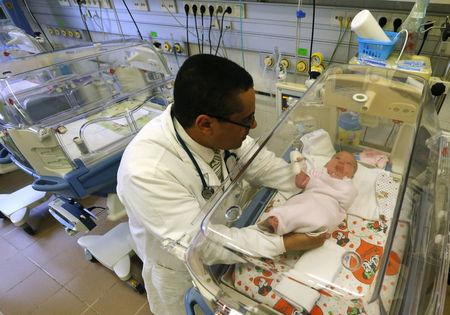
Abdulrahman Abdulrab Mohamed sometimes cooks Hungarian beef stew, his favorite dish, for his three sons using spices from Yemen, where he grew up.
The 45-year-old pediatrician, who has lived and worked in the town of Gyula near Hungary's eastern border with Romania for almost two decades, says he has become a Hungarian in his heart.
 PHOTO: REUTERS
PHOTO: REUTERSThe doctor, who treats hundreds of new-born babies each year, among them many premature ones, was voted by his patients on the Internet "Doctor of the Year" for his dedication. He received the prestigious Astellas prize in Budapest last week.
Austria says expects Germany to follow migrant border clampdown
A former migrant to Hungary, Mohamed told Reuters he had found his adopted country and true calling as a doctor in Gyula, where he is fully accepted by Hungarians.
This embrace by Hungarians has not changed since last year when the country became a key route for hundreds of thousands of migrants fleeing war and poverty in the Middle East and Africa.
The influx prompted Hungary's government to erect a fence along the country's borders with Serbia and Croatia to keep out migrants. Surveys showed most Hungarians supported the idea.
"My heart beats faster when a Hungarian wins (in sports), when I hear the Hungarian national anthem," he says, adding that he had never felt like an outsider in the town.
"I do not feel an alien here, they let me into their house, to their most valued treasure (their child) ... and they place a lot of trust in me," said Mohamed, who has been a Hungarian citizen since 2007.
 PHOTO: REUTERS
PHOTO: REUTERSHis case is one of the success stories of integration in Hungary, which granted asylum or some other kind of international protection to just 508 migrants last year.
German populist party eyes gains despite ‘shoot the migrants’ uproar
In his consulting room, the doctor treats a small girl who has a skin problem in a playful manner which puts both her and her mother quickly at ease. The walls are decorated with fluffy toys and cartoon characters.
"For us, the doctor is not a foreigner," says the girl's mother, Nora Kander-Beres. "We have accepted him. He has lived here for a long time and for us, he is not Yemeni ... he is Hungarian."
A LONG JOURNEY
Mohamed came to Hungary in 1989, the year when communism collapsed, to study medicine on a state scholarship.
He grew up in a village in northern Yemen and decided to be a doctor after his younger sister died when she accidentally swallowed a coin. There was no doctor around to save her.
Tragedies at sea: 35 migrants drown in two accidents off Turkey
"We tried to help her as best as we could, but unfortunately ... she died in front of our eyes," he said.
His initial experiences in Hungary were not always positive.
Once the institute where he stayed with other foreign students in 1989 was surrounded by skinheads, with a reputation for violence and racism.
 PHOTO: REUTERS
PHOTO: REUTERS"The first night was scary as we were told not to leave the institute in the morning because it is surrounded by skinheads ... I had no idea who skinheads were," he said.
He graduated in 1996, and after spending two years in his homeland, he returned to Hungary. Since then he has not had any negative experiences here, he said.
"A friend asked me why did you return from Yemen? I said I was homesick," he said.
When asked whether he considered himself Yemeni or Hungarian he said, "This is like when you ask a mother which of her children she loves: I don't have a first or second home. I love both countries the same."
Mohamed, who treated several migrant children from Syria in the Gyula hospital last year, said he was convinced that Europe should not be left alone to resolve the migration crisis.
Austria defies push for EU migrant solution with new border controls
"This a problem for the whole world to solve, not just Europe," he said, adding that Hungarians' fears of migrants could also be understood.
"I myself, have not felt any difference whatsoever; people here like me just the same as a year ago, or two years ago."

















COMMENTS
Comments are moderated and generally will be posted if they are on-topic and not abusive.
For more information, please see our Comments FAQ